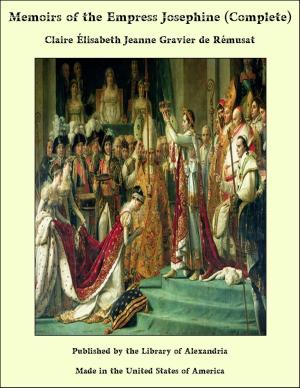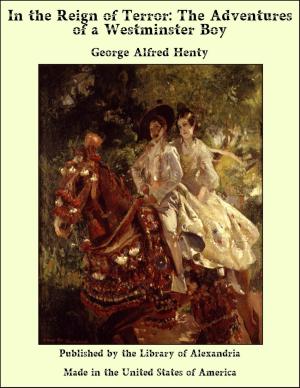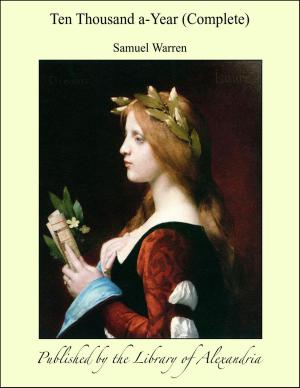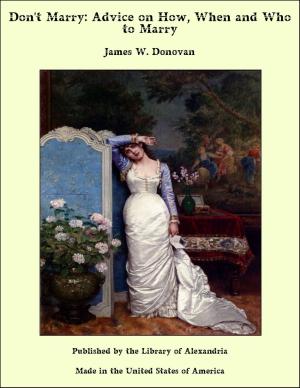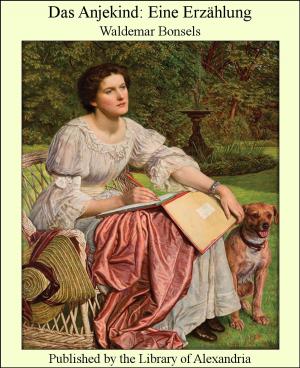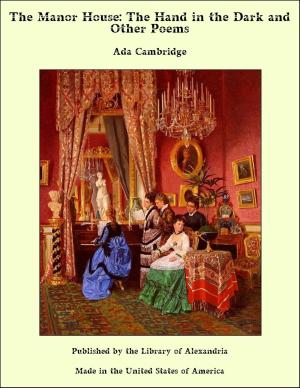The Pit Town Coronet: A Family Mystery (Complete)
Nonfiction, Religion & Spirituality, New Age, History, Fiction & Literature| Author: | Charles James Wills | ISBN: | 9781465575173 |
| Publisher: | Library of Alexandria | Publication: | March 8, 2015 |
| Imprint: | Language: | English |
| Author: | Charles James Wills |
| ISBN: | 9781465575173 |
| Publisher: | Library of Alexandria |
| Publication: | March 8, 2015 |
| Imprint: | |
| Language: | English |
Big Reginald Haggard had been exceedingly attentive to the elder of two very pretty girls of the name of Warrender. Both families came from the eastern counties. The Warrenders had inhabited The Warren, or at all events the older portion of the house, for nearly four centuries. They were harmless people. They manfully stuck to their ancestral acres of fat Essex land. The present head of the family farmed the greater part of the estate himself, as his fathers had done before him. Many a Warrender had held the rich living of King's Warren, and the parson, whoever he might be, and the reigning Squire Warrender were always the two greatest men in King's Warren village and parish. In the rather old-fashioned garden at The Warren sat a young lady, an open book upon her lap; the book was not a novel, it was an argumentative work, a book which dealt with the social problems of the day. But, alas! the book which Georgina Warrender had brought out with the serious intention of reading, for the Warrenders of either sex, though always soft-hearted, were a hard-headed race, lay upside down upon her lap. The fact is that she was weighing a man in the balance, an interesting occupation for a lady, and, alas! finding him a little wanting. Georgie Warrender had received a great deal of attention during the London season. Her people were well-to-do, the ancestral freeholds were unencumbered, her family was eminently respectable and well known, her connections unimpeachable; but Miss Warrender's principal attraction to those who had the privilege of her acquaintance outside the world of balls, dinner parties and musical evenings, was the sturdy open-heartedness of her character, which often distinguishes well brought-up young ladies who have been reared in an atmosphere at once intelligent and healthy, but not ultra-intellectual. Miss Warrender had no craze. She played and sang sufficiently well, but not well enough to be a terror to the home circle. She drew and sketched, as a pastime, but she had no desire to compete with professional artists, nor was her conversation interlarded with the jargon of the craft. Her reading had been carefully directed by her governess, Miss Hood, who had remained to discharge the onerous duties of chaperon, guide, philosopher, and, above all, friend to Georgie Warrender and her cousin Lucy. Lucy Warrender was Georgie's cousin on the father's side. Colonel Warrender, as the younger brother, was naturally intended for the family living of King's Warren. But fiery young George Warrender declined the Church altogether, so he was sent to Hailybury, and then he became a soldier of John Company, and was soon known as Fighting George Warrender, and by dint of following his own bent attained the colonelcy of a native regiment. Then he had a good determined shake at the pagoda tree. And then he made a fool of himself, for just as he had come down to Bombay, having made up his mind to take two years' leave, he was smitten by the blonde beauty of a newly-imported "spin," fresh from the boarding-school; and being an impulsive man, Colonel George Warrender married the little boarding-school miss, and changed his mind about his furlough. Within a year his daughter Lucy was born. And then the cholera came to Bebreabad, swept off Colonel Warrender and his pale-faced child-wife; and the little Lucy, his orphan daughter, came home at once in charge of an ayah in the Company's ship "Lord Clive." On her arrival Squire Warrender pitied the little misery, as she was called by everybody, and treated her as his own daughter. There was but two years' difference between the girls, and they looked upon each other as sisters. The squire's wife had died within a year of his daughter's birth, so that practically neither of the cousins had ever known a mother's care. Squire Warrender's wife had been a local beauty, and her portrait, which hung in Mr. Warrender's study, represented a loveliness of no common type.
Big Reginald Haggard had been exceedingly attentive to the elder of two very pretty girls of the name of Warrender. Both families came from the eastern counties. The Warrenders had inhabited The Warren, or at all events the older portion of the house, for nearly four centuries. They were harmless people. They manfully stuck to their ancestral acres of fat Essex land. The present head of the family farmed the greater part of the estate himself, as his fathers had done before him. Many a Warrender had held the rich living of King's Warren, and the parson, whoever he might be, and the reigning Squire Warrender were always the two greatest men in King's Warren village and parish. In the rather old-fashioned garden at The Warren sat a young lady, an open book upon her lap; the book was not a novel, it was an argumentative work, a book which dealt with the social problems of the day. But, alas! the book which Georgina Warrender had brought out with the serious intention of reading, for the Warrenders of either sex, though always soft-hearted, were a hard-headed race, lay upside down upon her lap. The fact is that she was weighing a man in the balance, an interesting occupation for a lady, and, alas! finding him a little wanting. Georgie Warrender had received a great deal of attention during the London season. Her people were well-to-do, the ancestral freeholds were unencumbered, her family was eminently respectable and well known, her connections unimpeachable; but Miss Warrender's principal attraction to those who had the privilege of her acquaintance outside the world of balls, dinner parties and musical evenings, was the sturdy open-heartedness of her character, which often distinguishes well brought-up young ladies who have been reared in an atmosphere at once intelligent and healthy, but not ultra-intellectual. Miss Warrender had no craze. She played and sang sufficiently well, but not well enough to be a terror to the home circle. She drew and sketched, as a pastime, but she had no desire to compete with professional artists, nor was her conversation interlarded with the jargon of the craft. Her reading had been carefully directed by her governess, Miss Hood, who had remained to discharge the onerous duties of chaperon, guide, philosopher, and, above all, friend to Georgie Warrender and her cousin Lucy. Lucy Warrender was Georgie's cousin on the father's side. Colonel Warrender, as the younger brother, was naturally intended for the family living of King's Warren. But fiery young George Warrender declined the Church altogether, so he was sent to Hailybury, and then he became a soldier of John Company, and was soon known as Fighting George Warrender, and by dint of following his own bent attained the colonelcy of a native regiment. Then he had a good determined shake at the pagoda tree. And then he made a fool of himself, for just as he had come down to Bombay, having made up his mind to take two years' leave, he was smitten by the blonde beauty of a newly-imported "spin," fresh from the boarding-school; and being an impulsive man, Colonel George Warrender married the little boarding-school miss, and changed his mind about his furlough. Within a year his daughter Lucy was born. And then the cholera came to Bebreabad, swept off Colonel Warrender and his pale-faced child-wife; and the little Lucy, his orphan daughter, came home at once in charge of an ayah in the Company's ship "Lord Clive." On her arrival Squire Warrender pitied the little misery, as she was called by everybody, and treated her as his own daughter. There was but two years' difference between the girls, and they looked upon each other as sisters. The squire's wife had died within a year of his daughter's birth, so that practically neither of the cousins had ever known a mother's care. Squire Warrender's wife had been a local beauty, and her portrait, which hung in Mr. Warrender's study, represented a loveliness of no common type.


